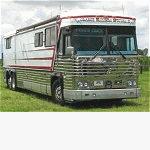| Author | Message | ||
| Peter River (Whitebus)
Registered Member Username: Whitebus Post Number: 214 Registered: 4-2009 Posted From: 24.234.166.174  Rating: N/A |
is there any good tips on how to track down air leaks? i don't mean the obvious hissing sounds coming out of some places but a silent, pinhole slow leaks that takes days to air down. I guess I know to spray the lines with dishwater liquid, but I am wondering if I am missing something else that may be valuable. | ||
| Debbie and Joe Cannarozzi (Joe_camper)
Registered Member Username: Joe_camper Post Number: 217 Registered: 10-2006 Posted From: 99.23.137.192  Rating: N/A |
Pete preform and then tell us the results of the pretrip I explained in your door thread. How much loss and how fast for all 3 FIRST parking brakes set. THEN parking brakes released. Finally parking brakes released with your foot depressing and holding the brake. Amout of loss and time frame for each. With this info if you do have a problem we can help steer you to it. This test is your starting point. Others out there? Ask away no dumb questions here | ||
| Buswarrior (Buswarrior)
Registered Member Username: Buswarrior Post Number: 1808 Registered: 12-2000 Posted From: 76.68.122.123  Rating: N/A |
Go to the exhaust ports on all valving that has one. Replace the valves that weep air. Isolate shutter/damper controls and watch it hold air for days. happy coaching! buswarrior | ||
| Peter River (Whitebus)
Registered Member Username: Whitebus Post Number: 215 Registered: 4-2009 Posted From: 24.234.166.174  Rating: N/A |
Debbie and Joe, my leaks are really really slow. (days) I am just asking for future reference. (Message edited by whitebus on February 21, 2010) | ||
| FAST FRED (Fast_fred)
Registered Member Username: Fast_fred Post Number: 1094 Registered: 10-2006 Posted From: 69.19.14.42  Rating: N/A |
While the Greenys will have a hissy fit, It has been done to inject a refill can of freon in the air system , and look with a refrigeration sniffer. It gets the Reeealy slow leaks! FF | ||
| Jim Wilke (Jim Bob) (Pd41044039)
Registered Member Username: Pd41044039 Post Number: 446 Registered: 2-2001 Posted From: 184.0.5.73 Rating: N/A |
Well Fred, maybe 134A would keep the Greenies happy. Oh, wait, there isn't any way to keep them happy. | ||
| john w. roan (Chessie4905)
Registered Member Username: Chessie4905 Post Number: 1856 Registered: 10-2003 Posted From: 71.58.71.157  Rating: N/A |
why use freon...use propane and a couple of matches. They do make a very sensitive leak detector/ microphone/amplifier/headset that can be used for this. I'd use a mechanic's stethoscope for large leaks and get a couple of bottles of leak detector from a refrigeration supply place for the little ones. Just paint it around all the air line fittings. Just remember that a component that wasn't seeping this week may start next week. You'll eventually find that some minor leakage is acceptable, but Hey, go for it.Buswarrior has given you a great place to start. Remember that some things leak only when they are actuated. | ||
| George M. Todd (George_todd)
Registered Member Username: George_todd Post Number: 944 Registered: 8-2006 Posted From: 99.39.13.50 Rating: N/A |
Looking for air leaks with refrigerant won't work. All of the newer electronic sniffers will find a Freon leak of 1/2 ounce of liquid per year. An air leak of 1 PSI per hour is HUGE in refrigeration standards, and a sniffer will alarm as soon as you get into the bay, let alone near the evaporator. These sniffers can be de-sensitized several ranges, but bus air systems are just not refrigeration systems, just the refrigerant passing thru the pores of an air bag will set off a detector. As far as the "greenies" go, doing it with R12, or R22 is illegal, 134a would be OK. The molecules of 134a are so much smaller than those of R12, that they would go thru the walls of an R12 hose if it were not for the old oil and sludge that has baked on over the years. R12 to 134a conversions in older cars aren't real successful, in part because the different oil required by 134a dissolves some of the dirt settled in the system, which gets into the compressor, which fails shortly thereafter. 134a gets thru R12 O rings too. BW has suggestsed by FAR the best method. G | ||
| RJ Long (Rjlong)
Registered Member Username: Rjlong Post Number: 1678 Registered: 12-2000 Posted From: 67.182.48.162  Rating: N/A |
Peter - If you go to the "Article of Interest" section, the Pre-Trip Inspection has a air brake system check out procedure that elaborates on what Joe outlined above. FWIW & HTH. . .  | ||
| Jack Conrad (Jackconrad)
Registered Member Username: Jackconrad Post Number: 1229 Registered: 12-2000 Posted From: 74.4.63.215  Rating: |
Go to your local Dollar Store and buy a bottle of the soap solution chidren use to make bubbles by waving that little wand through the air. Put it in a spray bottle and spray all connections, valves etc. This solution works very well. I have seen it take over a minute for a single bubble to form if it is a very small leak, but it still finds it. Jack | ||
| David Guglielmetti (Daveg)
Registered Member Username: Daveg Post Number: 147 Registered: 2-2009 Posted From: 209.77.228.123  Rating: N/A |
Or...a few drops of dishwashing liquid in a spray bottle of water...spray on connections and watch for bubbles. Jack, I have never heard of the bubble solution...is it much better? |